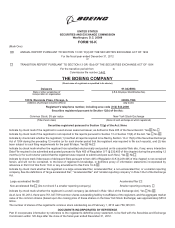Boeing 2012 Annual Report Download - page 21
Download and view the complete annual report
Please find page 21 of the 2012 Boeing annual report below. You can navigate through the pages in the report by either clicking on the pages listed below, or by using the keyword search tool below to find specific information within the annual report.9
increased levels of U.S. government oversight with respect to several key business systems of U.S.
government prime contractors. These requirements may result in increased compliance costs, and we
could be subject to additional costs in the form of withheld payments and/or reduced future business if we
fail to comply with these requirements in the future. Compliance costs attributable to current and potential
future procurement regulations such as these could negatively impact our financial condition and operating
results.
The U.S. government may modify, curtail or terminate one or more of our contracts. The U.S. government
contracting party may modify, curtail or terminate its contracts and subcontracts with us, without prior notice
and either at its convenience or for default based on performance. For example, in 2011, the U.S. Army
terminated for convenience the entire BCTM program. In addition, funding pursuant to our U.S. government
contracts may be reduced or withheld as part of the U.S. Congressional appropriations process due to
fiscal constraints, changes in U.S. national security strategy and/or priorities or other reasons. Further
uncertainty with respect to ongoing programs could also result in the event that the U.S. government
finances its operations through temporary funding measures such as “continuing resolutions” rather than
full-year appropriations. Any loss or anticipated loss of expected funding and/or modification, curtailment,
or termination of one or more large programs could have a material adverse effect on our earnings, cash
flow and/or financial position.
We are subject to U.S. government inquiries and investigations, including periodic audits of costs that we
determine are reimbursable under U.S. government contracts. U.S. government agencies, including the
Defense Contract Audit Agency and the Defense Contract Management Agency, routinely audit government
contractors. These agencies review our performance under contracts, cost structure and compliance with
applicable laws, regulations, and standards, as well as the adequacy of and our compliance with our
internal control systems and policies. Any costs found to be misclassified or inaccurately allocated to a
specific contract will be deemed non-reimbursable, and to the extent already reimbursed, must be refunded.
Any inadequacies in our systems and policies could result in withholds on billed receivables, penalties
and reduced future business. Furthermore, if any audit, inquiry or investigation uncovers improper or illegal
activities, we could be subject to civil and criminal penalties and administrative sanctions, including
termination of contracts, forfeiture of profits, suspension of payments, fines, and suspension or debarment
from doing business with the U.S. government. We also could suffer reputational harm if allegations of
impropriety were made against us, even if such allegations are later determined to be false.
We enter into fixed-price contracts which could subject us to losses if we have cost overruns.
Our BDS business generated approximately 70% of its 2012 revenues from fixed-price contracts. While
firm fixed price contracts enable us to benefit from performance improvements, cost reductions and
efficiencies, they also subject us to the risk of reduced margins or incurring losses if we are unable to
achieve estimated costs and revenues. If our estimated costs exceed our estimated price, we recognize
reach-forward losses which can significantly affect our reported results. The long term nature of many of
our contracts makes the process of estimating costs and revenues on fixed-price contracts inherently risky.
Fixed-price contracts often contain price incentives and penalties tied to performance which can be difficult
to estimate and have significant impacts on margins. In addition, some of our contracts have specific
provisions relating to cost, schedule and performance.
Fixed-price development contracts are generally subject to more uncertainty than fixed-price production
contracts. Many of these development programs have highly complex designs. In addition, technical or
quality issues that arise during development could lead to schedule delays and higher costs to complete,
which could result in a material charge or otherwise adversely affect our financial condition. Examples of
significant BDS fixed-price development contracts include AEW&C, FAB-T, India P-8I, Saudi F-15, USAF
KC-46A Tanker, and commercial and military satellites.
























